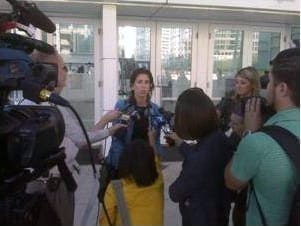Fighting Arizona’s Mandatory Delay Law
Tucson Women’s Center v. Arizona Medical Board
When Clara Jones* needed to go to the doctor’s office, she traveled six hours roundtrip and needed to change her work schedule and arrange for childcare. If a new state restriction in Arizona requiring a 24-hour waiting period for an abortion were in place, Clara would not have been able to return to the doctor’s office for at least a week.
Christina Smith* wouldn’t be able to go back for a month. Christina is in the military and would have had difficulty obtaining the time off and arranging childcare for a second visit.
The Center filed a lawsuit in the U.S. District Court of Arizona arguing that the requirement, part of a more comprehensive law restricting abortion, should be prohibited from taking effect until a complete trial on the constitutionality of the statute is held. This week, the court denied the Center’s request to temporarily block enforcement of the restrictions — restrictions that will significantly reduce a woman’s access to abortion services and put physicians at risk of losing their licenses. The federal judge did acknowledge that a payment provision within the law was ambiguous, and asked the Arizona Supreme Court for a definitive interpretation of the provision. The payment provision would prohibit a physician or any healthcare provider from charging for any services provided to a patient who inquires about abortion until after she has received the required informed consent counseling, even if the patient has no plans to get an abortion. Planned Parenthood also filed a challenge against certain provisions of the same law in Maricopa County Superior Court in Phoenix. That court also ruled this week and granted a preliminary injunction blocking enforcement of certain parts of the law. Because of this injunction, women will not have to make two trips to a physician’s office in order to obtain an abortion, as would have been required if the law went into effect as written. The Center’s recent report, Defending Human Rights: Abortion Providers Facing Threats, Restrictions, and Harassment, documents the variety of legal restrictions placed on abortion and details the severe burdens that “mandatory delay” laws inflict on women. Requiring a woman to make two separate trips to a healthcare provider — one to receive state-mandated information and one to undergo the abortion procedure — imposes an undue burden on a woman’s right to choose abortion. Arizona’s two-trip requirement would prevent some women from getting an abortion altogether and cause others to significantly delay the procedure, appreciably increasing health risks and costs. “We are disappointed that the federal court did not recognize the harms that this law will cause women in Arizona. Thankfully, the state court blocked enforcement of the parts of the law that would have had the most impact in making it harder, or even impossible, for women — particularly those who are in abusive relationships, suffer from illness, and are poor — to get an abortion,” said Suzanne Novak, senior attorney at the Center. “We will consider all the options for our clients as we move forward to make sure they and their patients will not suffer harm because of the law.” The Center represents two abortion providers, their respective medical office, and an obstetrician-gynecologist who does not provide abortions. Simpson Thacher &, Bartlett, LLP and LaVoy &, Chernoff, PC are co-counsel on the case. |
|
The case is Tucson Women’s Center v. Arizona Medical Board >,
 Suzanne Novak, senior staff attorney at the Center,
in front of Arizona court house.
Suzanne Novak, senior staff attorney at the Center,
in front of Arizona court house. 